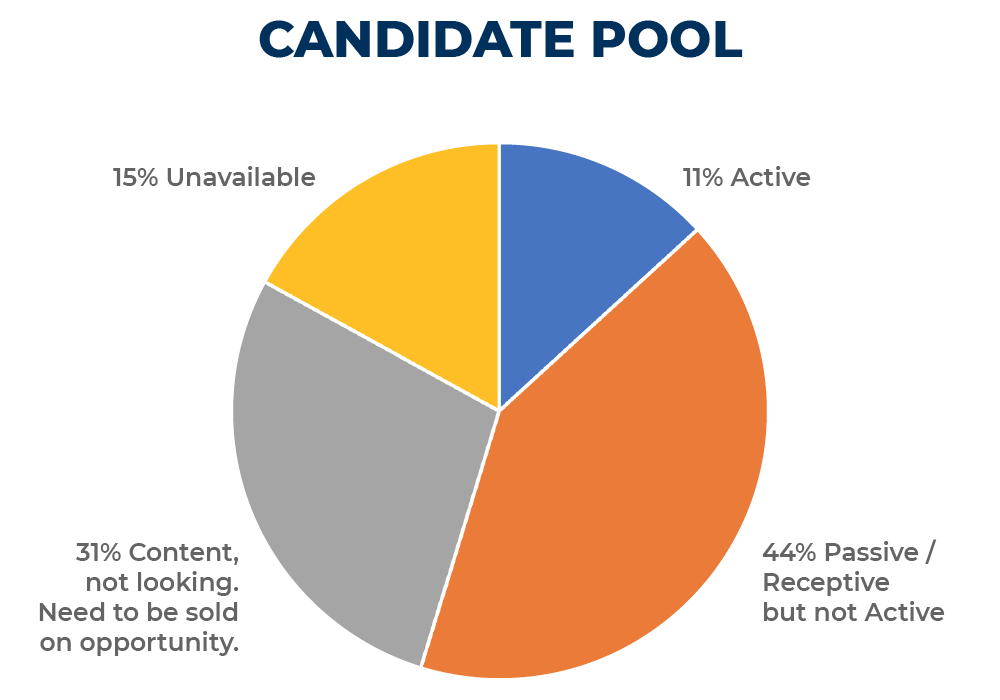
Creating Interest & Engagement within a Competitive Landscape for Executive Talent
If you have ever led or participated in an executive search, you are most likely aware that the most desirable candidates are the most challenging to engage with. Executive candidates who are not actively looking for a new opportunity are generally too busy in their current role to read job postings, solicitation emails, take cold calls, or return voice mails. When one ponders the why, it’s most often found to be that they are quite satisfied in their current role and see no reason to invest their valuable time in exploring a new opportunity.
Research shows that 75% of the potential candidate pool needs to be recruited.

With the bulk of the candidate universe being passive and requiring direct recruitment, it is critical that interaction with these potential candidates be on-point to engage their interest fully. Recruiting passive candidates requires more research and data to identify and target optimal candidates, more personalization, information, and a more compelling story when crafting messages, and more time and effort to build candidate trust. As executive search consultants, we have an extensive repertoire of tools and strategies to gain interest, dialogue, and engagement from passive talent. One of those tools comes in the form of a candidate brief, and for this article, we will share the benefits of having one as part of your executive recruitment strategy.
Compelling Candidate Briefs Contribute to Securing Higher Quality Leadership Hires
Passive candidates are generally high performers who are very content in their companies and jobs. As a result, they are not actively looking for new roles and need to be drawn out of their routines. The only way to do so is to build their trust and steer their interest.
High-performing executives are often very accustomed to being called on by members of their professional network, prospective employers, and executive search consultants soliciting their interest in opportunities. The response rate from such people is generally directly correlated to the caller’s relationship and/or reputation or how the opportunity is represented. This is why accomplished search consultants place a high value on their relationship with key talent and their reputation in their respective markets.
A key element of representing an opportunity is presenting a concisely written and prepared candidate brief. A purposefully written job description that balances promoting the employer brand with the requirements for hiring is an essential tool in the recruitment process. Think back to the myriad position descriptions you have seen throughout your career and consider the implications you observed in each. The sloppier, cut-and-paste abbreviated versions will scream out that you are being invited to work for an organization mired in mediocrity, while others will credibly and competently imply there’s a brighter path forward if you continue to explore what you are being invited to explore. Which one are you more likely to be interested in?
A compelling candidate brief will combine visual and written content and articulate the value proposition of the role, highlights the benefits of working for your company – including culture, vision, and growth opportunities and can make a meaningful contribution to securing candidate interest.
Creating an impactful candidate brief is just one of the many aspects of an executive search assignment led by The ExeQfind Group. Want to see an example? See our contact info below to reach out and learn more about how we work closely with our clients to create a compelling candidate brief. With 75% of candidates being passive, with more open jobs than candidates seeking opportunities, and companies employing retention strategies like never before, today’s job market is very much candidate-driven. Crafting and deploying a candidate brief that sets your organization apart from others will go a long way towards gaining candidate interest, compel them to explore your opportunity over others, and improving the candidate experience from the very first interaction. Establishing interest, trust and engagement conveys much about your corporate culture, can turn a passive candidate into an engaged one, and can become a key decision-making factor when a candidate considers whether to leave their current employer.

Sylvia MacArthur
Sylvia combines leadership experience in both business and executive search. She serves as the Chairman of the Board for The ExeQfind Group, is a past President of a global executive search alliance and is listed by BusinessWeek magazine as one of the Top 100 Most Influential Headhunters. Sylvia works between offices in New York City and Toronto and has an extensive track record of search throughout the Americas and globally.

Warren Carter
Warren’s management and leadership experience includes military service, logistics, and executive search. Warren serves as the CEO of The ExeQfind Group and is a past Board Member and Practice Group leader of a global executive search alliance. Warren supports clients from offices in Atlanta, and has an extensive track record of executive search throughout the Americas and globally.
